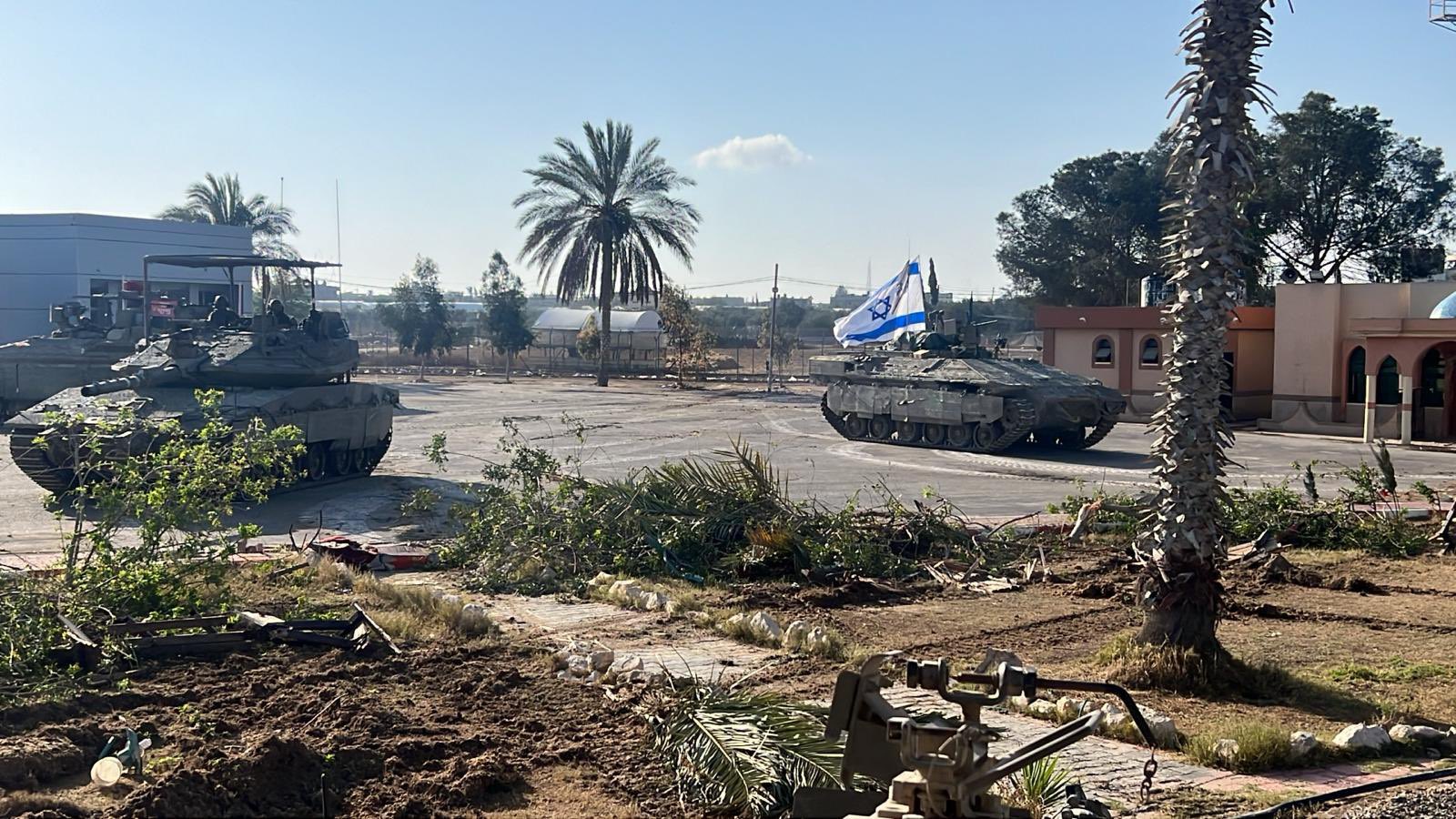There are at least 600,000 children in Rafah, described as “the city of children.”
Qatar has strongly condemned Israel’s invasion of the Gaza-Egypt Rafah Crossing on Tuesday and the targeting of the city’s municipality, as ceasefire talks continue in hopes of securing a deal.
“Qatar condemns in the strongest terms the bombing by the Israeli occupation forces that targeted the municipality of Rafah, its invasion of the land crossing and the threat to displace citizens from shelters and housing centres,” Doha’s foreign ministry said in a statement on Wednesday.
The Gulf state called for “urgent international action to prevent the invasion” and genocide in Rafah as well as the protection of civilians under international and humanitarian law.
Qatar also warned of the forced displacement of Palestinians from Rafah, which it said represented “a serious violation of international laws, and would double the worsening humanitarian crisis in the besieged Strip.”
Rafah ground invasion
Israeli occupation forces went ahead with the ground invasion of Rafah on Tuesday following months of threats. The Israeli army had forced people to evacuate the eastern side of Rafah before its tanks reached the vital Rafah Crossing, which Gaza shares with Egypt.
Footage showed Israeli tanks entering the crossing and destroying the Gaza welcome sign while replacing the Palestinian flag with Israel’s.
The Israeli military said that they established “operational control of the Gazan side of the crossing following intelligence that the Rafah Crossing in eastern Rafah was being used for terrorist purposes.”
However, Israel has long used the claim over the presence of Hamas fighters in areas where it carried out attacks in Gaza to justify its brutal moves.
Israeli occupation forces also launched deadly airstrikes in Rafah, where disturbing images showed children trapped under the rubble.
Since the beginning of the war, Israel has killed more than 34,700 people, of which more than 70 percent are women and children.
There are at least 600,000 children in Rafah, described by the United Nations children agency (UNICEF) as “the city of children.”
Rafah is densely populated with at least 1.4 million people, more than half of Gaza’s population, who have been sheltering in the city. Most of the people in Rafah were initially ordered by the Israeli military to evacuate the north in October.
The vital Rafah Crossing is the only portal in and out of Gaza and has enabled thousands of injured Palestinians to travel abroad for treatment.
While aid has been barely crossing over into Gaza due to Israel’s complete blockade, the border served as the main entry point for aid trucks. All aid entry and evacuation efforts have been stopped due to the Israeli invasion.
On Tuesday, Human Rights Watch (HRW) said “Israel is contravening the International Court of Justice’s (ICJ) legally binding orders” regarding the entry of aid and humanitarian services.
“Despite children dying from starvation and famine in Gaza, the Israeli authorities are still blocking aid critical for the survival of Gaza’s population in defiance of the World Court,” said Omar Shakir, Israel and Palestine director at HRW.
UN Secretary-General Antonio Guterres also voiced his concern over the Rafah invasion.
“I am disturbed and distressed by the renewed military activity in Rafah by the Israeli Defence Forces. I urge the Government of Israel to stop any escalation, and engage constructively in the ongoing diplomatic talks,” he said on X.
The Palestinian Presidency’s official spokesman, Nabil Abu Rudeineh, described the attack on Rafah as a war crime and called on the United States to prevent a further invasion of Rafah.
“The Rafah land crossing and the rest of the territory of the Gaza Strip is occupied Palestinian land in accordance with international legitimacy resolutions, but the occupation, supported by America with weapons, money and political cover, insists on continuing to defy international legitimacy because the American veto will protect it,” he said.
The U.S., Israel’s chief supporter, said the occupation forces did not cross a red line with their invasion, two officials from Washington told Axios.
White House spokesman John Kirby told a briefing that Tel Aviv told Washington that the operation in the Rafah crossing is “limited.”
In a rare move, the U.S. reportedly paused a shipment of thousands of bombs to Israel, including ones weighing 2,000 pounds (more than 900 kg), U.S. officials said on Tuesday, cited by The Washington Post.
“Israel should not launch a major ground operation in Rafah, where more than a million people are sheltering with nowhere else to go,” a senior administration official told the American newspaper.
Ceasefire talks in Cairo continue
Hopes over a ceasefire in Gaza first emerged on Monday when Hamas accepted a Qatari-Egyptian proposal, which entailed a 124-day truce that would eventually lead to a lasting ceasefire.
However, Israel’s Prime Minister Benjamin Netanyahu claimed the proposal did not meet Israel’s demands. It also confirmed that it will send an Israeli technical team for Tuesday’s talks in Cairo.
“The War Cabinet unanimously decided this evening Israel will continue its operation in Rafah, in order to apply military pressure on Hamas so as to advance the release of our hostages and achieve the other objectives of the war,” the statement read.
Tuesday’s talks in Cairo gathered delegations from Qatar, the U.S., Egypt, Hamas and Israel, with the discussions expected to continue on Wednesday, two Egyptian sources told Reuters.
Hamas also confirmed via its Telegram channel that its delegation had landed in the Egyptian capital on Tuesday.
CIA Director Bill Burns is also scheduled to travel from Egypt to Israel to meet Netanyahu and other Israeli officials, a source familiar with the matter told Reuters.
Speaking to reporters in Beirut on the same day, Hamas official Osama Hamdan warned that there will be no agreement if Israel continues its aggression in Rafah.







